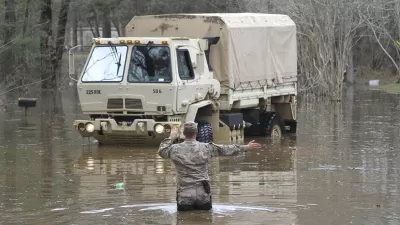Researchers are working to understand how people behave during wildfire events and how to most effectively get people to safety during deadly fires.

In a piece for Wired, Aarian Marshall describes the growing field of wildlife evacuation research, which is becoming a more crucial piece of cities’ emergency plans as wildfires become more destructive and unpredictable.
When evacuations go wrong, they really go wrong. In LA’s Pacific Palisades neighborhood, panicked drivers stuck in traffic abandoned their vehicles in the middle of evacuation routes, leaving emergency crews unable to reach the fires. Authorities used bulldozers to push empty cars out of the way.”
Researchers are working to understand how people respond to evacuations and how to most effectively get key information across in emergency situations. “The research thus far suggests that reactions to wildfires, and whether people choose to stay, go, or just wait around for a while, can be determined by a bunch of things: whether residents have been through wildfire warnings before, and whether those warnings were followed by actual threats; how the emergency is being communicated to them; and how the neighbors around them react.”
While some residents who have experienced fires before are more likely to stay, others are more likely to evacuate. Lower-income people are less likely to flee, most likely due to reduced access to transportation and lodging. According to Marshall, “It’s a faint silver lining, that the horror Californians experienced this week might produce important findings that will help others avoid the worst in the future.”
FULL STORY: The Evolving (and Inexact) Science of Wildfire Evacuation

Maui's Vacation Rental Debate Turns Ugly
Verbal attacks, misinformation campaigns and fistfights plague a high-stakes debate to convert thousands of vacation rentals into long-term housing.

Planetizen Federal Action Tracker
A weekly monitor of how Trump’s orders and actions are impacting planners and planning in America.

In Urban Planning, AI Prompting Could be the New Design Thinking
Creativity has long been key to great urban design. What if we see AI as our new creative partner?

Pedestrian Deaths Drop, Remain Twice as High as in 2009
Fatalities declined by 4 percent in 2024, but the U.S. is still nowhere close to ‘Vision Zero.’

King County Supportive Housing Program Offers Hope for Unhoused Residents
The county is taking a ‘Housing First’ approach that prioritizes getting people into housing, then offering wraparound supportive services.

Researchers Use AI to Get Clearer Picture of US Housing
Analysts are using artificial intelligence to supercharge their research by allowing them to comb through data faster. Though these AI tools can be error prone, they save time and housing researchers are optimistic about the future.
Urban Design for Planners 1: Software Tools
This six-course series explores essential urban design concepts using open source software and equips planners with the tools they need to participate fully in the urban design process.
Planning for Universal Design
Learn the tools for implementing Universal Design in planning regulations.
planning NEXT
Appalachian Highlands Housing Partners
Mpact (founded as Rail~Volution)
City of Camden Redevelopment Agency
City of Astoria
City of Portland
City of Laramie





























